A Visit to Liechtenstein
One of my hobbies is trying to make it into the “Century Club.” The Century Club is people who’ve been to 100 countries and territories. The “and territories” makes it somewhat easier to get into. The rules for what constitutes a country or territory can be found here. The list can be found here. Alaska, for example, counts separate from the US because it is not geographically contiguous with the rest of the US.
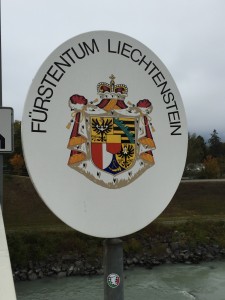 As I write this I’m in Liechtenstein, which is #74 on my list. I decided to make this a project after hearing about it from a friend, Valerie. She’s on 90-something, so way ahead of me.
As I write this I’m in Liechtenstein, which is #74 on my list. I decided to make this a project after hearing about it from a friend, Valerie. She’s on 90-something, so way ahead of me.
My experiences in Liechtenstein these past few days show the benefit of a seemingly weird thing to do like try to join the Century Club. Earlier this week I was on business in Germany. My work finished on Friday afternoon, too late to get back home to Jerusalem for the start of Shabbat. So what to do with a weekend in Europe? Why, just a few hours away there’s another country I can add to my list! So of course that’s what I did.
I’m VERY impressed with Liechtenstein. It’s an amazing little country. Yet I never would have made the effort to come here without the inspiration of the “Century Club” thing. Travel is all about seeing new things, new sights, meeting new people, etc. Having the Century Club as a goal adds a delicious element of serendipity to travel. I didn’t have to do a whole bunch of research ahead of time to decide whether or not Liechtenstein would be the best possible place for me to spend a couple of days in Europe. It was another “x” I could fill in on my spreadsheet, and that was enough reason to go. And now that I’m here, I’m very glad I am.
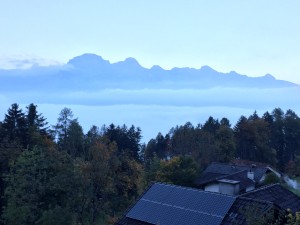 I’ve been running and hiking in the Alps in Liechtenstein over the last couple of days. The scenery is stunningly beautiful. I was reminded of a story from Rabbi Samson Raphael Hirsch, the great 19th century German rabbi. He was going to Switzerland on vacation, and someone from his community said, “But rabbi, a vacation? Isn’t that ‘bitul Torah,’ neglecting the study of Torah? (in other words, isn’t that somehow a sin?)” R. Hirsch replied, “When I die and meet my creator, what will I say when he asks me “So, Sammy, did you see my Alps?” Maybe it’s from my Austrian mother, but I just love being in the mountains. Somehow my soul feels more at peace in the mountains than anywhere else. I’ll take the mountains over a beach any day of the week, and I love SCUBA Diving. This is a great place for a lot of my favorite sports. For running you can either run in the beautiful mountains, or go down to the Rhine and have a nice long flat course. They have a ski resort, alpine hiking, mountain biking.
I’ve been running and hiking in the Alps in Liechtenstein over the last couple of days. The scenery is stunningly beautiful. I was reminded of a story from Rabbi Samson Raphael Hirsch, the great 19th century German rabbi. He was going to Switzerland on vacation, and someone from his community said, “But rabbi, a vacation? Isn’t that ‘bitul Torah,’ neglecting the study of Torah? (in other words, isn’t that somehow a sin?)” R. Hirsch replied, “When I die and meet my creator, what will I say when he asks me “So, Sammy, did you see my Alps?” Maybe it’s from my Austrian mother, but I just love being in the mountains. Somehow my soul feels more at peace in the mountains than anywhere else. I’ll take the mountains over a beach any day of the week, and I love SCUBA Diving. This is a great place for a lot of my favorite sports. For running you can either run in the beautiful mountains, or go down to the Rhine and have a nice long flat course. They have a ski resort, alpine hiking, mountain biking.
One run I did was a 12k loop that left from the village I’m staying in, Triesenberg. I recommend the loop for anyone who visits and is into hiking or running, it was very pretty. You can see the route and details at Wikiloc. I also went to the ski resort of Malbun today, lots of great hiking over there as well.
One interesting observation. I almost never find that the speed limit is higher than I feel comfortable driving. Here, however, they seem lazy when it comes to assigning speed limits. If you’re out in a rural area on a non-major freeway the speed limit is 80 km/hour. Doesn’t matter if it’s a little dinky one lane very curvy road where you’d have to be insane to be driving more than 40 km/hour.
Liechtenstein also has a lot of fascinating history and quirky facts. It’s one of the smallest countries in the world, yet it has the second highest GDP per capita, over $140,000/year of any country in the world. The only country with a higher GDP per capita is another “micro state,” Monaco. The whole country is only 25km, about 15 miles, from one end to the other. Total population of the entire country is 37,000 people.
Some interesting facts about Liechtenstein:
- It has nearly twice as many registered corporations as citizens (73,700).
- The above is explained by a very low corporate tax rate; most of the corporations are “letter box” companies.
- It is one of only two “double land locked countries.” A land locked country bordered only by other landlocked countries (Switzerland and Austria).
- It is the smallest country to win an Olympic medal
- It is the only country to win a winter Olympic medal without also winning a summer Olympic medal
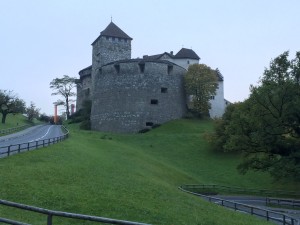
- It became a principality of the Liechtenstein family in 1719, but it took over 100 years before a member of the family actually came for a visit (they have lived here full-time since before WWII).
- It’s the world’s largest manufacturer of false teeth (my dentist friends no doubt knew that).
- According to the US State Department there are about two dozen Jews living in Liechtenstein. A few hundred Jews found refuge here (for a price) during WWII.
- Liechtenstein disbanded its army in 1868.
Liechtenstein may be the LARGEST country that does NOT have a Chabad House. The only sign of an organized Jewish community is there is a Friends of Yad Vashem Liechtenstein. I tried contacting the person given as a contact to see if there were any Jews I might get together with for a Shabbat meal, but never got an answer. I did a little more research and found the person apparently is in the business of registering corporations so might not even be part of the community himself. UPDATE: A friend tells me there is a Chabad in Vaduz, Liechtenstein, but they keep a low profile. Contact Chabad Switzerland for info.
Our lives are often so thoroughly planned and mapped out. The pleasure I’ve had in visiting Liechtenstein is a reminder of the need to allow room for randomness and spontaneity in our lives. Being open to new experiences, just because they are new.

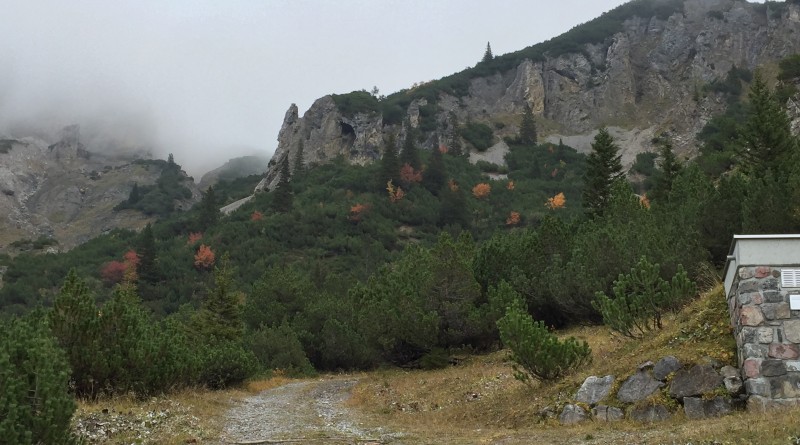
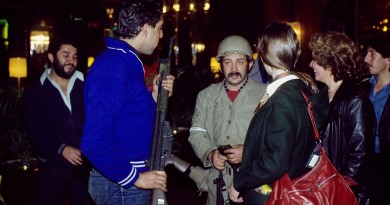
Recently, while reading the Hebrew Bible, I stumbled upon this compelling verse I feel I should share:
Leviticus 17:11 {For the life of all flesh is in the blood, and I (God speaking) give it to you upon the altar for the atonement of your souls, for it is blood that gives atonement for one’s soul.}
As I studied more of the Torah I realized that the temple sacrifices were being made so frequently that the altar fire had to be kept continuously burning (Leviticus 6:2-6) and it was said that whenever a sacrifice was accepted it had a “sweet aroma” to God.
Mosaic Law prescribed at least five different types of sacrifices for the Israelites, but throughout the Hebrew scriptures there are many examples of laity offering sacrifices for the forgiveness of sin, to give thanks and to gain favor with their Creator. That includes the grain and meat sacrifices Cain and Abel made to God (Genesis 4:3), the sacrifice Noah offered to the Lord when he stepped off the Ark (Genesis 8:20), the sacrifice Manoah, the father of Samson, made so his barren wife would conceive (Judges 13:19-20) and the sacrifices Job offered every morning for each of his sons in case any of them had pondered committing a sin (Job 1:5).
Those sacrifices were being made because the moment Adam and Eve partook of the forbidden fruit they and all their descendants became separated from God, they were cursed and their natures were corrupted (Genesis 3:7-21). That separation is evident when one considers the fact that no one, including Aaron the high priest, could enter the Holy of Holies while the presence of God dwelled there lest he die (Leviticus 16:1-2). However, it seems the temple sacrifices temporarily bridged the chasm between God and man because Moses told the Kohanim and the “congregation” that whenever an oblation pleased God He descended to earth from heaven in all His glory (Leviticus 9:1-4).
Per Leviticus Chapters 1 – 7, sacrifices of whole burnt offerings had to be made in perpetuity due to Adam and Eve’s fall from grace and our sinful, carnal nature. Even Gentiles who believed in the God of Israel were required to make animal sacrifices (Isaiah 56:6-8).
Bearing all of this in mind, how can a contemporary Jew, or anyone for that matter, obtain remission of sin without the ordained temple sacrifices? These scriptures offer us some important clues: Genesis 3:22, Psalm 22:15-20, Hosea 11:1, Micah 5:1-2, Zechariah 9:9, Isaiah 7:14, Isaiah 48:16, Isaiah 53, Daniel 7:9-14 and Daniel 9:24-26. I hope this blesses you.